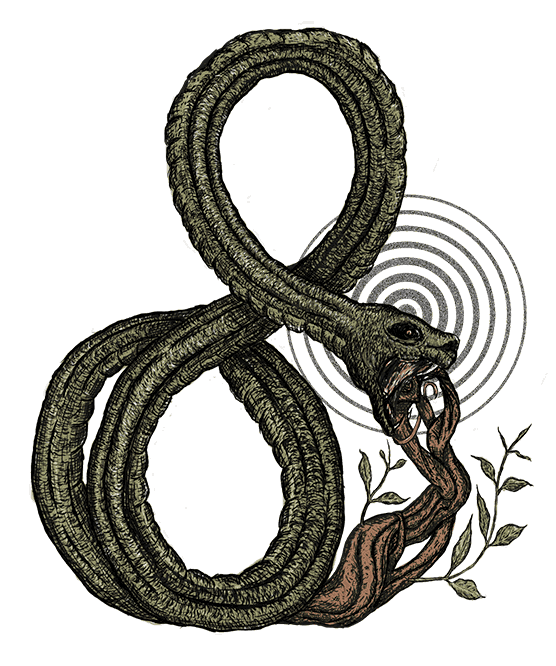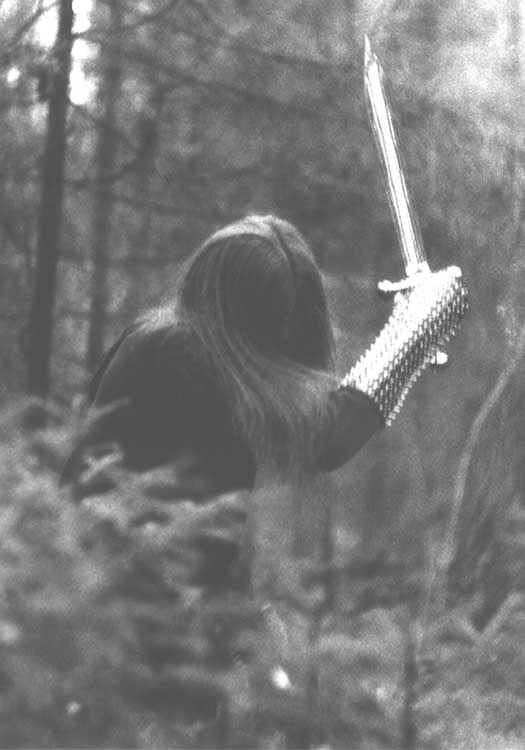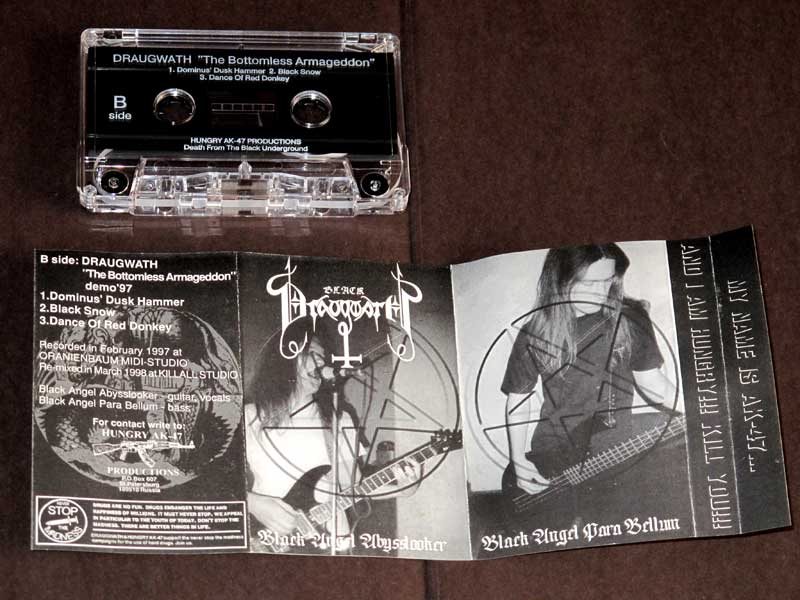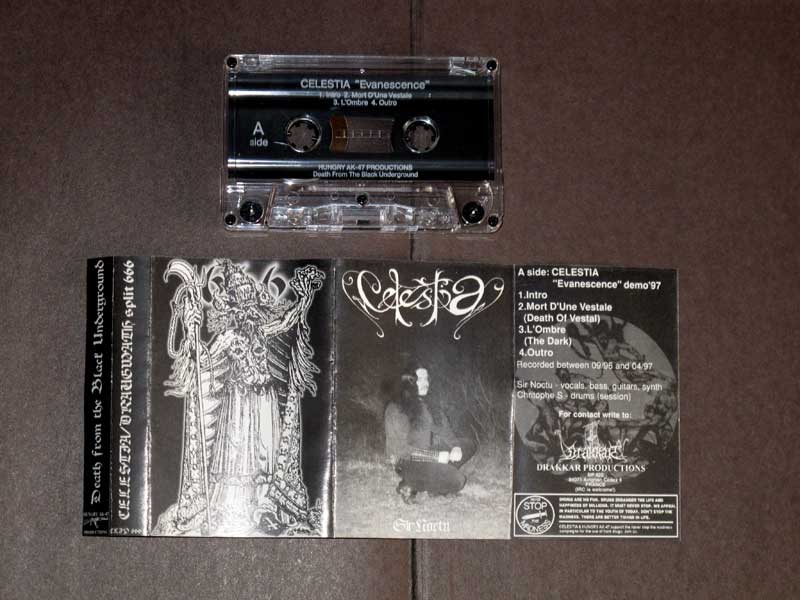Blackdeath I
2024-05-22
by Niklas Göransson
Spawned from the 90s project Draugwath, Blackdeath has deep roots in the Russian black metal scene. Co-founder and frontman Para Bellum reflects on their thirty-year legacy.
PARA BELLUM: After our last album, the uncompromising “Phantasmhassgorie” (2019), we decided to experiment. In the past, songwriting for BLACKDEATH often started with a basic guitar riff followed by bass and drum arrangements – quite typical for a metal band. But on “Also sprach das Chaos”, we used a technique that has proven rather successful in our side project, CTHULHU.
CTHULHU features the same three members as BLACKDEATH. Para Bellum handles vocals and bass, his twin brother – Abysslooker – plays guitar, and Maya is on drums.
PARA BELLUM: The method is as follows: first, I play a bassline that Abysslooker makes into a guitar melody. It is then arranged to become the main riff while my bass fades into the background where it belongs. The BLACKDEATH song structures are more complex, but this works great for a minimalist project like CTHULHU.
Founded in 1996, CTHULHU started out playing droning ambient music. With their 2018 resurgence – ushered in by “Hallucinations in the Colour Out of Space” – they transitioned into ‘minimalistic avant-garde black metal’.
PARA BELLUM: Abysslooker also wrote plenty of material for “Also sprach das Chaos” on his own, so glueing everything together wasn’t easy. Sometimes, we had to rework the guitars to align with Maya’s drum parts. In general, it was a ‘cut and try’ method, which is obviously nothing new for extreme music. We also tried to make the riff transitions smoother unless the contrary was required.
“Also sprach das Chaos” – BLACKDEATH’s tenth studio album – is described as an esoteric mystery tale with elements of anti-cosmic Gnosticism. The main story plays out in the second track, whereas the first serves as an epilogue of sorts.
PARA BELLUM: From the very beginning, we wanted to write two songs of about twenty minutes in length, each optimised for one LP side. I always start my lyrics once the music is ready – never vice versa. So, with the lengthy compositions in mind, it seemed only natural for me to approach the text almost like a manuscript.
Both songs – “Paralysiertes Äquinoktium / Мир рухнул” and “Im Labyrinth” – have lengthy, well-written lyrics which also come translated into English.
PARA BELLUM: The music – Maya’s drumming, in particular – sets the action. Since the plot was dictated by riff changes, my vocal performance turned into a kind of one-man play. I must also point out how perfectly the sound effects and keyboard lines added by TT reflect the theatrical narrative. But actually, I hate theatre. Any theatre is a bunch of poseurs.
Once the trio finished up at Hiboll Studio in St Petersburg, ABIGOR’s TT mixed, edited, and mastered the recording. “Also sprach das Chaos” was released by End All Life Productions in October 2021.
The two metal epics are impressive in their own right, but what really caught my attention was “Мир рухнул” – the outro to the first song. It consists entirely of bizarre chants reinforced by electronic effects and noises, all boiling down into a strange, narcotic haze.
PARA BELLUM: That description is undoubtedly ‘bingo’. “Мир рухнул” – which is Russian for ‘The World has Collapsed’ – was originally a kind of choral fantasia for dope smoking. My brother and I used to be cannabis fiends, and it was an attempt to convey our perception of reality through that weird state. We found it quite logical to use this hymn on “Also sprach das Chaos”, seeing as how the album concept came from a similar state.
Can you elaborate on that?
PARA BELLUM: The imagery of being lost in a maze emerged after Abysslooker and I got stoned in Tilburg, the Netherlands, and then wandered around trying to find our apartment. Over the years, we’d tried getting various musicians to make a proper composition out of our cannabis psalm, but nobody seemed to take us seriously. Only with Maya’s help were we able to bring it to fruition.
After recording all vocal parts in their rehearsal room, they left the rest up to TT.
PARA BELLUM: He turned “Мир рухнул” into a real martial industrial anthem, giving it an even greater impact as the outro to “Paralysiertes Äquinoktium” (‘Paralysed Equinox’), which describes the collapse of the cosmos. While this was never our intention, it apparently came out as a parody of the Russian Orthodox church service – and probably of BATUSHKA.
Today’s BLACKDEATH evolved from DRAUGWATH – one of the earliest Russian black metal bands. The original line-up featured Abysslooker on guitar and drum programming, Nightshadow as vocalist, and Para Bellum on bass. The name was taken from Tolkien’s fictional universe and means ‘Wolf’s Spirit’.
During the spring of 1995, DRAUGWATH recorded a two-track promo at Killall Studio – a rehearsal space named in honour of their close friend Cyril ‘Kill’ Zakharov, who supplied the equipment. Oddly, Para Bellum, along with his bass, is absent from this release.
PARA BELLUM: Technically, we couldn’t connect my bass guitar to the tape deck. Instead, I participated as a makeshift sound engineer, managing the recording process. This quasi-studio was entirely analogue; we hadn’t started using computers back then, so the songs were captured live.
Live with a drum machine?
PARA BELLUM: Yes, Abysslooker played the guitar with his hands and controlled the drum machine with his foot – indeed, just like that – while Nightshadow screamed into a microphone. The atmosphere felt great, but our gear kept collapsing and breaking down, which is another reason we christened the studio Killall.
A few months later, in October 1995, DRAUGWATH recorded their first official demo, “Dwellers of the Cursed Forest”. Still no bass guitar – instead, Para Bellum appears as keyboardist. These synthesisers actually sound quite haunting, surpassing most demos from that era.
PARA BELLUM: I used two vintage Soviet keyboards. Admittedly, not the type of analogue devices played by Klaus Schulze – but for black metal, they sounded far superior and more authentic than any Casio. I’d describe our approach as adeptly utilising whatever was at hand.
Today, “Dwellers of the Cursed Forest” is considered somewhat of an early Russian black metal milestone, having been re-issued on both CD and LP. Back in ‘95, the reception was a bit more tepid.
PARA BELLUM: Upon its release, we faced mostly criticism. A handful appreciated “Dwellers…”, but they were outnumbered then compared to now. These days, it appears we ourselves are the harshest critics of this demo.
In late 1995, Nightshadow was asked to leave DRAUGWATH. The band’s official biography cites ‘disciplinary infractions’ as a contributing factor.
PARA BELLUM: Well, the fact of the matter is that Nightshadow’s self-image as a black metal genius was somewhat overestimated. He might’ve been an excellent vocalist, but he fobbed off everything else with nothing but empty talk. In fact, the “Dwellers of the Cursed Forest” cover was originally the visual representation of a long list of grievances presented to Nightshadow.
PARA BELLUM: While speaking over the phone, Abysslooker doodled those bizarre creatures based on the words he uttered. The fallen tree was drawn when they discussed the fact that Nightshadow had been spotted talking to unauthorised individuals. He also tended to shift responsibility for his black metal disputes onto us, so we advised him to address such issues himself.
Just like in Europe, the Russian black metal scene was rife with feuding factions. Para Bellum spoke at length about this in the more personal BLACKDEATH piece in Bardo Methodology #8.
PARA BELLUM: Nightshadow was under the impression that DRAUGWATH would flounder without him. Of course, he was mistaken, and we never came to regret his expulsion. If he’d had any actual merit, Nightshadow would’ve founded his own project. He never did and so remained merely the vocalist of “Dwellers of the Cursed Forest”. We sometimes meet him at local gigs, and he hasn’t changed a bit.
In 1996, to reflect their harsher musical direction, the project was renamed BLACK DRAUGWATH. Abysslooker took over as vocalist. The brothers also found a drummer – Ereth.
PARA BELLUM: We were ecstatic to finally be able to jam as a full band. However, our understanding of music was very basic at that time, and the coveted sense of monolithic flow occurred only briefly. Nevertheless, when it did, it felt highly fulfilling.
Come the autumn, BLACK DRAUGWATH recorded “Apocalyptic Songs” – a four-track rehearsal demo released through their own label, Hungry AK-47 Productions.
PARA BELLUM: BLACK DRAUGWATH had already progressed beyond the material on “Dwellers of the Cursed Forest”, so my brother and I were eager to present our new material with a complete lineup. Unsure of when we’d get the chance to record in a proper studio, we put out a rehearsal demo on Hungry AK-47 Productions. The distro was going well, and trading allowed us to frequently update our catalogue.
One of the many underground labels they encountered was France’s Drakkar Productions, who’d just burst onto the scene with two Les Légions Noires titles. Drakkar’s first and second CD releases were MÜTIILATION’s “Vampires of Black Imperial Blood” and “Black Legions Metal” – a split featuring VLAD TEPES and TORGEIST.
PARA BELLUM: Stunned and fascinated by these works, as were all true black metallers of that era, Abysslooker and I sent Drakkar our own recordings. BLACK DRAUGWATH didn’t land the contract we’d dreamed of, but at least this led to regular correspondence and trading with Noktu (Drakkar) – typical underground dealings, essentially.
In February 1997, BLACK DRAUGWATH entered Sound Line in St Petersburg to record their debut album, “Bottomless Armageddon”. Many new discoveries awaited them in the studio.
PARA BELLUM: No matter how funny it might appear now, that’s when we learned the advantages of using a metronome. Sadly, Ereth faced even greater challenges, leading to his replacement with midi-drums. This outcome sounded far from ideal; the engineer even suggested we discard the entire recording. It was a shock, but it helped us realise that black metal is not only about running through the forest at night wielding torches.
Two months after the studio visit, BLACK DRAUGWATH played their debut gig at the Polygon Club in St Petersburg.
PARA BELLUM: It was absolutely dreadful – in the worst sense of the word. From memory, the mildest criticism of our set went something like, ‘Well, you ended the songs as if one member was too tired to continue, and then the others just stopped.’
Given Ereth’s lacklustre studio performance, one would assume he didn’t fare much better in concert.
PARA BELLUM: Truth be told, Ereth wasn’t the sole culprit here. On stage, we spontaneously decided to change the setlist, but I immediately forgot about it. So, when Abysslooker started playing one song, I went into another. What Ereth was doing would be anyone’s guess. Yet, when all three happened to be performing the same material, there were indeed successful moments. I noticed a couple of times how parts of the audience looked fascinated, which at least offered some form of consolation.
This gig marked the end of BLACK DRAUGWATH’s collaboration with Ereth.
PARA BELLUM: At the very beginning, before being ravaged by drugs and vodka, Ereth was a rather serious guy. Abysslooker and I felt certain that we’d found a true brother-in-arms. Unfortunately, the man deteriorated right before our eyes, applying the classic black metal slogan ‘Never Stop the Madness’ to every facet of life. Hard drugs severely undermined his health, ultimately leading to him applying for and then receiving disability benefits.
In early 1998, employing his home studio setup, Abysslooker revisited the botched recording from the year before. Two of the reworked songs were used for “Evanescence / The Bottomless Armageddon”, a split album with BLACK DRAUGWATH and CELESTIA – featuring Noktu of Drakkar Productions – issued on cassette by Hungry AK-47 Productions.
PARA BELLUM: Indeed, that ‘revision’ became our salvation. If your entire album is disregarded, salvaging even two songs feels like a triumph. We asked Noktu if any Drakkar band would be interested in a split, and he offered us CELESTIA. Frankly, they seemed slightly too melodic compared to BLACK DRAUGWATH, but we saw it as an opportunity for a striking contrast.
The same year, as Abysslooker and Para Bellum prepared another recording, they renamed the band BLACKDEATH. This was in part to mirror their musical evolution but also to rid themselves of Tolkien associations. During the spring, the duo held a series of auditions with local drummers.
PARA BELLUM: We tried out some guys from death metal bands we were in touch with, but none of them wanted to play our kind of music – not even as session members. The only actual black metal drummers around were our stated ‘scene enemies’. During the 1990s, there was a general shortage of drummers in underground metal.
BLACKDEATH even negotiated with MANIAC BUTCHER from the Czech Republic about bringing over Vlad Blasphemer for a recording.
PARA BELLUM: Unfortunately, Vlad was afraid to visit Russia due to the high crime rate. He had a family, so nothing ever came of it. Then we spoke with Izbor from OLD WAINDS, and he was eager to take part. Abysslooker and I eventually turned down the idea, though – I can’t recall the exact reason now, but perhaps our paranoia played in. I guess the guy is still sulking about this.
log in to keep reading
The second half of this article is reserved for subscribers of the Bardo Methodology online archive. To keep reading, sign up or log in below.














